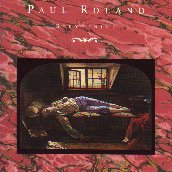
Paul Roland is a youngish Canterbury born singer/ songwriter. His music has a literary quality about it which evokes, but never imitates, the Gothic Romances of Edgar Allen Poe, the Edwardian Fantasy of H.G. Wells and the eccentric humour of Lewis Carroll.
His success in Europe has been achieved through his own efforts, acting as his own manager as well as producer.
STRYCHNINE is a mini-CD ( 42 minutes - it should be also destined for release on vinyl on the Greek DIDI label) of cover versions with a difference: in Paul's own words 'I chose songs which were melodically and lyrically strong and which I felt I could make my own.' Of interest to WAWS readers is Paul's interpretation of Ayers' classic LADY RACHEL, and thereby hangs a tale...
In the summer of 1989, Paul wrote to ask if I had any suggestions for songs he could record. His version of 'Mathilda Mother' on the Syd Barrett tribute album 'Beyond The Wildwood' (Imaginary) inspired me to suggest Lady Rachel and I sent a cassette of Ayers' solo version from the Capital Radio session (August 1974) plus the original 'Joy Of A Toy version.
In the autumn of 1992 Paul announced in one of his newsletters that he'd spent the summer recording an album of other people's songs; 'This year seemed to be the right time to do it, eerily confirmed by friends who, without knowing what I was planning, asked if I had ever considered recording an album of covers.'
In the final analysis, Roland's version of Lady Rachel, with acoustic guitar, doubletracked vocals and what sounds like a flugelhorn is not as inspired as it could be. Check out though the versions of the Electric Prunes' 'Too Much To Dream' and the Velvet Underground's 'Venus In Furs'; the former a bizarre amalgam of Garage-Psych and Baroque-Classical, the latter featuring a lead guitar that towers and topples by turns. ( Editor much fancies Bolan's 'Iscariot' and Donovan's 'Guinevere' as firm favourites in this set!)
Newcomers to Roland's considerable talents should also enjoy the four self-penned tracks recorded for a Greek radio session, and then seek out his earlier work, of which there is plenty.
Barry King
first published in WAWS #3, July 93